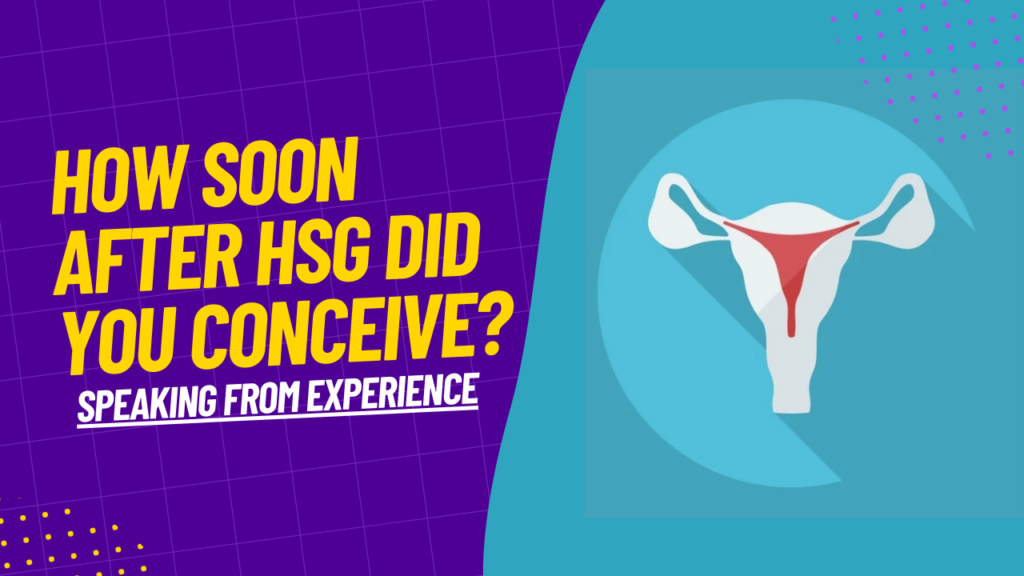If you’re trying to conceive and have undergone an HSG procedure, you may be wondering how soon you can expect to become pregnant. While there is no definitive answer, we spoke with women who have been through the process and looked into the latest research to shed some light on the topic.
What is an HSG?
HSG stands for hysterosalpingogram, which is a diagnostic test used to evaluate the condition of a woman’s uterus and fallopian tubes. During the procedure, a dye is injected into the uterus, which then flows through the fallopian tubes. X-rays are taken to create images that can help identify any blockages or abnormalities in the reproductive system.
How soon after HSG did you conceive?
While individual results can vary, many women are able to conceive within the first cycle after an HSG procedure. In fact, one study found that 39% of women became pregnant within three months of the procedure, and 72% became pregnant within six months.
We spoke with several women who underwent the procedure, and their experiences varied. Some women reported conceiving within a few weeks of the HSG, while others took several months or longer to become pregnant. However, all of the women we spoke with eventually became pregnant after the HSG.
What factors can affect the timing of conception after an HSG?
While most women are able to conceive relatively quickly after an HSG, individual factors can play a role in the timing of conception. Age, overall health, and fertility status are all important considerations. Women who are older or have infertility issues may take longer to conceive even after an HSG. Additionally, any blockages or abnormalities identified during the procedure may need to be addressed before conception can occur.
How does an HSG affect fertility?
While the HSG is primarily a diagnostic tool, some studies suggest that it may also have a therapeutic effect on fertility. One study found that women who underwent an HSG were more likely to conceive within the next six months compared to those who did not have the procedure. The researchers hypothesized that the dye used during the procedure may help to clear any blockages or debris in the reproductive system, making it easier for sperm to fertilize an egg.
What are the risks associated with an HSG?
Like any medical procedure, there are some risks associated with an HSG. The most common side effects are cramping, spotting, and discomfort during the procedure. In rare cases, the procedure can cause an infection or damage to the uterus or fallopian tubes. However, these risks are generally considered low, and your doctor will take steps to minimize them during the procedure.
What was your experience like undergoing an HSG?
We spoke with several women who underwent an HSG, and their experiences varied. Some women reported feeling mild discomfort during the procedure, while others reported feeling no pain at all. Most women reported some spotting and cramping after the procedure, but these side effects generally subsided within a day or two.
“I was really nervous before the procedure, but it ended up being much less painful than I expected,” said one woman we spoke with. “I had some cramping afterward, but overall it was a pretty easy process.”
Another woman shared a different experience: “I had a lot of pain during the procedure, which was unexpected. But I was able to conceive within a few months of the HSG, so it was definitely worth it.”
What should you do after an HSG?
After the HSG procedure, your doctor may recommend that you avoid
sex for a few days to minimize the risk of infection. However, once you have the green light, it’s safe to resume your normal activities.
It’s also important to stay in touch with your doctor and follow up as recommended. If any blockages or abnormalities were identified during the procedure, your doctor may recommend further testing or treatment before attempting to conceive.
Conclusion
Overall, while there is no definitive answer to how soon after HSG you can conceive, many women are able to become pregnant within a few months of the procedure. Individual factors such as age, overall health, and fertility status can all play a role in the timing of conception. However, the HSG procedure may also have a therapeutic effect on fertility, making it easier for sperm to fertilize an egg.
If you’re considering an HSG or have already undergone the procedure, it’s important to stay in touch with your doctor and follow up as recommended. By working with your doctor and staying informed, you can increase your chances of successfully conceiving.
Fun Tool: We have a tool that can let you know when you were Conceived. Seems funny right? Do check it out.
FAQs
Can an HSG increase the chances of conception?
While the HSG is primarily a diagnostic tool, some studies suggest that it may have a therapeutic effect on fertility, making it easier for sperm to fertilize an egg.
What are the risks associated with an HSG?
Like any medical procedure, there are some risks associated with an HSG. The most common side effects are cramping, spotting, and discomfort during the procedure. In rare cases, the procedure can cause an infection or damage to the uterus or fallopian tubes.
How soon after an HSG can you resume normal activities?
Your doctor may recommend that you avoid sex for a few days to minimize the risk of infection, but once you have the green light, it’s safe to resume your normal activities.
What should you do if abnormalities are identified during the HSG?
If any blockages or abnormalities are identified during the HSG, your doctor may recommend further testing or treatment before attempting to conceive.
How long does it typically take to conceive after an HSG?
While individual results can vary, many women are able to conceive within the first cycle after an HSG procedure. In fact, one study found that 39% of women became pregnant within three months of the procedure, and 72% became pregnant within six months.


